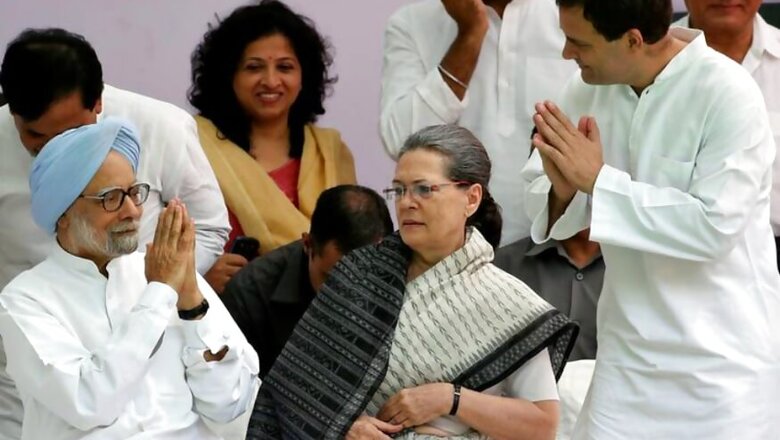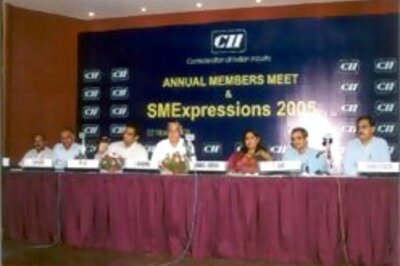
views
Dr YK Alagh had once described Manmohan Singh as the most underrated politician and most overestimated economist. In the present-day Congress, there is a near consensus that Singh is a politician among politicians.
The journey of economist Manmohan Singh evolving as an astute politician has been a fascinating tale. It came as little surprise when Singh chose to belittle his one-time mentor PV Narasimha Rao. Speaking at the 100th birth anniversary of former prime minister IK Gujral, Singh told a gathering in New Delhi how 1984 anti-Sikh massacre could have been avoided had the then home minister Rao acted upon the advice of Gujral.
“Gujral-ji was so concerned that he went to the then home minister Narasimha Rao that very evening... the situation is so grave that it is necessary for the government to call the army at the earliest. If that advice would have been heeded, perhaps the 1984 massacre could have been avoided," Singh said. The 1984 anti-Sikh massacre has been a highly emotive and sensitive issue where Rajiv Gandhi’s role has often come under scrutiny over the young prime minister’s failure to curb riots that killed over 3,000 Sikhs in Delhi alone. Eighty other cities across the country witnessed anti-Sikh violence after Indira Gandhi was assassinated by her Sikh bodyguards.
It is worth reflecting upon how Singh has been saying different things at different times on the 1984 riots. During his 1999 South Delhi Lok Sabha poll campaign, Singh had sought to implicate the Rashtriya Swayamsevak Sangh (RSS). Addressing a press conference at the Press Club of India on September 2, 1999, Singh had described the 1984 riots as “a black spot and the saddest event". He had, however, clarified that the Congress as an organisation had no role in it. Singh then went on to say that the first information reports lodged at different police stations in Delhi proved that several RSS men were involved in the riots.
The South Delhi seat in 1999 general elections ultimately proved to be unsurmountable for the good doctor as he had to battle infighting/sabotage from within the Congress and a strong BJP campaign targeting Sikh voters in the prestigious region not to vote for a party that had "blood on its hands". Singh lost to BJP’s Vijay Kumar Malhotra.
Within months of his electoral defeat, Singh adopted a different stance. The politician, who was given a Rajya Sabha berth by the then Congress chief Sonia Gandhi, clarified that he had not held the RSS solely responsible for the 1984 riots. On December 13, 1999, Singh said: “My statement was twisted for electoral gains. I had said that if there were individuals associated with the Congress and other organisations, including the RSS, who had taken part in the riots, they should be punished."
As prime minister, when Singh rose in the Rajya Sabha on August 11, 2005, to tender an unqualified apology over the killings, the RSS reference was missing. Instead, the prime minister said he was not standing on any 'false prestige' and bowed his head in shame. A somewhat emotional Singh also recalled how he had accompanied Sonia Gandhi to Harminder Sahib in 1999 and remarked, “We together prayed to give us strength and show us the way that such things never again take place in our country" and added “…as human beings we have the will power and we have the ability to write better future for all of us".
Interestingly, Sonia Gandhi’s trust in Singh was in sharp contrast to her husband Rajiv Gandhi’s rather dismissive outlook towards the economist. The year was 1985 when prime minister Rajiv Gandhi had taken a very urban-centric vision of development and restructuring of economy. Singh, at that point of time, was deputy chairman of the Planning Commission and Rajiv Gandhi, as prime minister, was its ex-officio chairman.
CG Somiah, a former Union home secretary who retired as the Comptroller and Auditor General of India, has recorded in his autobiography The Honest Always Stand Alone a famous incident involving Singh and Rajiv Gandhi that has now faded from public memory. Rajiv Gandhi had described the Planning Commission under Singh as a “bunch of jokers" who were bereft of any modern ideas for development.
The remark had reportedly hurt Singh and the economist had contemplated resigning from the commission. However, Somiah claims he convinced Singh to stay on. “I sat with him for nearly an hour, told him not to take the extreme step and blamed the prime minister’s ignorance for this behaviour. I further advised him that since the prime minister was young and inexperienced, it was our duty to educate him rather than abandon him. I was finally able to convince him not to act hastily and that was my good deed for the day," records Somiah in his autobiography.
But for journalist Vivek Kaul, the significant takeaway from the episode was that Singh did not quit even after the prime minister of the country publicly called him a “joker". “What this tells us clearly is that Singh would rather continue and compromise with the prevailing state of affairs than make bold decisions," Kaul observed in a column.
Singh remained subdued and side-lined during most part of Rajiv Gandhi’s regime and found himself in the University Grants Commission. On the morning of June 22, 1991, a Saturday, Singh received a telephone call at his Bahadur Shah Zafar Marg office. Rao, who was scheduled to take oath as prime minister that afternoon, was on the line. Rao said to Singh, “What are you doing there? Go home and change, and come straight to Rashtrapati Bhavan’."
On June 24, 1991, Singh held his first press conference as the country’s finance minister to announce the scope of impending reforms. He promised to clear the “cobwebs of unnecessary control" that had impeded economic development and decreed that “the world has changed, and the country must also change".
Singh’s budget speech on July 24, 1991, saw Congress backbenchers clapping lustily when he granted Rs 100 crore to the newly created Rajiv Gandhi Foundation, headed by the then apolitical Sonia Gandhi. Singh’s first Budget gave him many lessons in realpolitik.
His special gesture and unprecedented move to dole out Rs 100 crore grant to a private trust generated a controversy. The Opposition quickly made an issue of how a private trust was being given hard-earned taxpayer’s money. Sonia Gandhi, Priyanka Gandhi, Rahul Gandhi and Amitabh Bachchan — all trustees of the foundation then — were aghast. The move to grant the money boomeranged and withdrawing it would have made matters worse.
Rao asked Singh to clarify the government’s position to Sonia Gandhi. Singh called on Sonia Gandhi but as he sat facing her, he could not muster the courage to come to the point. He kept speaking in general terms till tea was served. Finally he began by apologising, saying he had no intention of embarrassing her or belittling the cherished memory of Rajiv Gandhi, and then going on to explain the government’s dilemma. The grant was withdrawn after Sonia Gandhi wrote a letter to Rao. It said, “While we thank you personally and your colleagues for this most generous gesture, it would be best if the government instead identified suitable projects and programmes and fund them directly and thus honour the memory of my husband."
Singh’s journey as a politician had begun and since then, there has been no looking back.
Between 2004 and 2014, the UPA, which had come into being hurriedly and under extraordinary circumstances following Sonia Gandhi’s act of renunciation in 2004, functioned well under Singh but the coalition faced innumerable challenges from within and outside. In the larger context, it worked more like a bureaucratic machine than a political conglomerate. There were many lacklustre performances in some key portfolios, while ministers frequently differed with each other, sidelined their juniors and cared little for a sense of accountability — a basic feature of parliamentary democracy.
The row over the nuclear deal saw a pragmatic side of Singh. In fact, from August 2007 to July 2008, Singh and Sonia Gandhi teamed up in a shrewd and decisive manner to checkmate their opponents. The N-deal crisis saw Singh give a rare and candid interview to Manini Chatterjee of The Telegraph where he said: “I told them [the Left] that it is not possible to renegotiate the deal. It is an honourable deal, the cabinet has approved it, we cannot go back on it. I told them to do whatever they want to do, if they want to withdraw support, so be it…"
Price rise and inflation, however, remained issues of major concern during Singh’s second innings as the prime minister but for some inexplicit reasons, in his total 1,379 speeches, Singh spoke about inflation only in 88 — 6.3%. Another sensitive issue of cross-border terrorism and national security figured as a low priority area for Singh. Of his total 1,379 speeches, the prime minister talked about terrorism in 307 speeches — 22% of the total speeches. More importantly, he failed to inspire confidence among common citizens. The disconnect on national security became glaring when the prime minister took four days to speak on the shocking issue of beheading of Indian soldiers at the Line of Control (LoC) with Pakistan.
Born in September 1932 at Gah (now in Pakistan), Singh moved to India when Britain split the subcontinent at Independence in 1947. For the first 12 years of his life he lived in Pakistan, apparently, there was no electricity, no school, no hospital, no piped drinking water in his village. Singh had to walk for miles every day to an Urdu-medium school and studied at night in the dim light of a kerosene lamp. When asked once why he had poor eyesight, he confessed that it was because he had spent hours reading books in that dim light. Urdu remained his first language of sorts throughout his life going beyond poetry. Each time Singh delivered a speech in Hindi, he chose Urdu script in bold 18 points to deliver.
When Singh was working at the United Nations under the famous economist Raúl Prebisch, he got an offer to join the Delhi School of Economics as a lecturer. He accepted the invitation, deciding to return to India in 1969. Dr Prebisch was rather surprised, wondering why a brilliant economist like him would give up a lucrative UN job and return to India. “You are being foolish," Prebisch told Singh, adding, “But sometimes in life, it is wise to be foolish!"
Returning to India definitely made Singh a politician among politicians.
(The author is a senior journalist. Views expressed are personal)




















Comments
0 comment